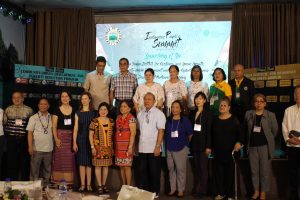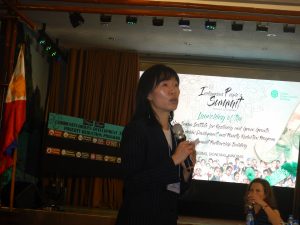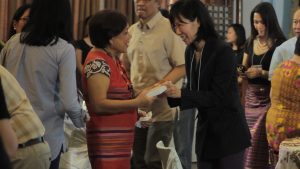Puerto Princesa City, Palawan, Philippines, October 12 – The Provincial Government of Palawan and the Global Green Growth Institute (GGGI) launched the New Banua Institute for Resilience and Green Growth to culminate the Palawan Indigenous Peoples’ Summit, a three-day gathering of almost 1,000 Indigenous People (IP) from the seven tribes in the Province of Palawan. The New Banua Institute is envisioned as the platform to address multi-dimensional poverty afflicting the marginalized constituents, particularly Indigenous People, as the Province pursues an inclusive, pro-poor and green development direction. It will support the operationalization of the Palawan Climate Resilience and Green Growth Framework, which was informed by the Climate Resilient and Green Growth Planning Project implemented by the Province in partnership with the GGGI and the Climate Change Commission (CCC).
Palawan, which is the largest province in the Philippines with a population of almost 1 million and recognized as one of the best island destinations of the world, is home to almost 450,000 indigenous people. It ranks as the most dynamic local economy among the five provinces comprising the MIMAROPA Region contributing more than 50% of its Gross Regional Domestic Product yet poverty is a lingering concern with poverty incidence in the rural areas and among IP communities estimated at almost 57%.
According to Governor Jose Chavez Alvarez, “the aspiration of the Provincial Government is to ensure that no one is left behind in the economic growth of Palawan – particularly our Indigenous brothers and sisters who are most vulnerable to both economic and climate related challenges. It is my vision that by the year 2022, we will have significantly contributed to poverty reduction and climate resilience through very focused interventions such as our Community Driven Poverty Reduction program and the New Banua Institute for Resilience and Green Growth”.
The New Banua Institute aims to enhance the knowledge of target communities to promote climate resilience and green growth while cultivating indigenous cultural practices and heritage; promote grassroots entrepreneurship; and establish market linkages for local products to broaden access to economic opportunities. “While the Provincial Government implements poverty reduction projects, we recognize the need for an institution that will sustainably focus on empowering our marginalized and IP communities through grassroots livelihood and knowledge development so they gain access to opportunities that will allow them to break the inter-generational cycle of poverty”, said Ms. Ninfa Rubio, Provincial Planning and Development Coordinator and Head of the Palawan CRGG Provincial Project Team.
Ms. Jin Young Kim, GGGI OIC Head of Programs for Asia and the Pacific, noted that “GGGI acknowledges the New Banua Institute as a very important and concrete result of our cooperation with the Palawan Provincial Government. We greatly appreciate that it is positioned as the mechanism through which initiatives that support climate resilience, inclusive development, and green growth, down to the community level, are pursued and scaled-up in the Province of Palawan. GGGI looks forward to sustaining the work with the Palawan Provincial and seeing to the successful implementation of the New Banua Institute”.


The New Banua Institute will facilitate the mobilization and convergence of local and external initiatives for marginalized and IP communities. Already, the personalities participating in the launch, which included Senator Cynthia Villar, representatives of Development Partners, National and Regional Government Agencies, and Private and Civil Society Organizations provided pledges of technical and financial assistance to support its operations.

Ms. Jin Young Kim, GGGI OIC Head of Programs for Asia and the Pacific with Senator Cynthia Villar
The Palawan Provincial Government will provide the main office of the Institute even as it is decentralized through satellite learning hubs in selected municipalities to effectively reach out to the target communities. GGGI extends technical advice in developing the operational guidelines and the initial activities to jumpstart its implementation as the Provincial Government allocates counterpart internal funding.